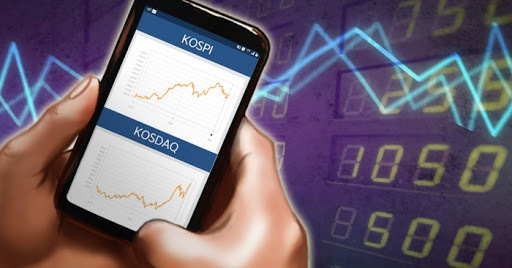 |
Stock market in South Korea (Yonhap) |
South Korean stocks slumped Tuesday for a second day amid lingering inflation concerns, with major tech and bio stocks coming under heavy selling pressure. The Korean won fell against the US dollar.
After veering in and out negative terrain, the benchmark Korea Composite Stock Price Index (KOSPI) fell 9.66 points, or 0.31 percent, to close at 3,070.09 points.
Trading volume was moderate at about 2.2 billion shares worth some 17.3 trillion won ($15.6 billion), with losers outnumbering gainers 563 to 300.
Foreigners sold a net 374 billion won, while retail investors purchased a net 79 billion won. Institutions bought a net 300 billion won.
The local stock market remained in a tight range on strong foreign sell-offs, as expectations of a fast economic rebound raised inflation concerns in global markets, pushing up commodities and US Treasury yields.
Overnight, the Nasdaq dipped 2.46 percent as tech stocks, sensitive to high inflation, retreated.
"The market is anticipating some positive guidance from (US Federal Reserve Chairman Jerome) Powell," Shinhan Investment analyst Choi Yoo-joon said. "If Powell comments on the recent bond yields hike, it could calm the markets in the short run," he said.
The US Federal Reserve is to hold its monetary policy meeting on Tuesday and Wednesday (US time).
In Seoul, top cap Samsung Electronics retreated 0.24 percent to 82,000 won, while No. 2 chipmaker SK hynix gained 1.47 percent to 138,500 won.
Top automaker Hyundai Motor moved up 1.24 percent to 244,500 won, with giant internet portal operator Naver climbing 1.03 percent to 390,500 won. Leading chemical firm LG Chem shed 3.38 percent to 885,000 won.
Pharmaceutical giant Samsung Biologics dropped 2.56 percent to 760,000 won, and Celltrion dipped 4.36 percent to 296,000 won.
The local currency closed at 1,110.6 won against the US dollar, down 0.2 won from the previous session's close.
Bond prices, which move inversely to yields, closed mixed. The yield on three-year Treasurys remained unchanged at 1.020 percent, and the return on the benchmark five-year government bond fell 0.3 basis point to 1.386 percent. (Yonhap)








![[Weekender] Korea's traditional sauce culture gains global recognition](http://res.heraldm.com/phpwas/restmb_idxmake.php?idx=644&simg=/content/image/2024/11/21/20241121050153_0.jpg)